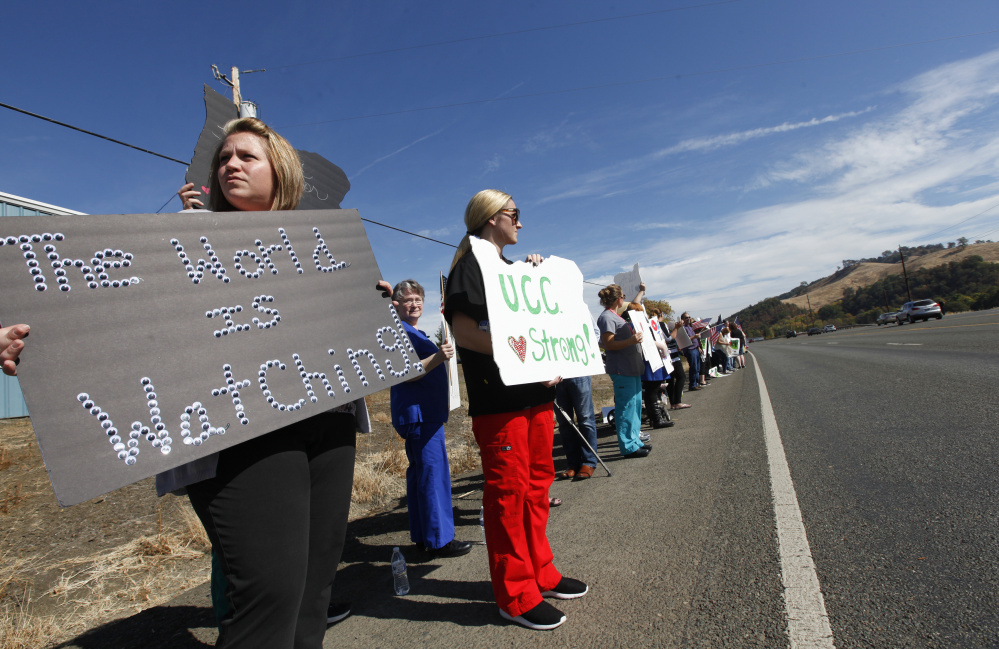Months of deadly mass shootings are pushing mental health legislation forward in Congress, with advocates and lawmakers describing a momentum for change that they haven’t seen for nearly a decade.
Early this month, by sheer coincidence, leaders of five advocacy groups met with the head of a powerful House committee just hours after a student opened fire at an Oregon community college. As pictures of the campus flashed on the TV screen in his office, Energy and Commerce Committee Chairman Fred Upton, R.-Mich., promised to make mental health reform a priority this fall.
“He told us, ‘We’re going to work on this … Democrats and Republicans are going to work together,’ ” recalled Paul Gionfriddo, the president of Mental Health America.
This shift in prospects comes against a complicated backdrop. The politics behind mental health legislation have long been tangled up with the politics of gun control on Capitol Hill. And with little change on the latter, advocates and congressional Democrats remain reluctant to have mental health measures be seen as the sole response to escalating gun violence, in part because they don’t want to perpetuate inaccurate stigmas about the mentally ill being more dangerous.
Headway also has been stymied by deep disagreements over how to best change the mental health system. Families of individuals with severe mental illness usually want greater ability to intervene, including mandated treatment; legal advocacy groups, as well as many patients, emphasize prevention and early identification, better access to care and broad civil rights protections. None of it would come cheaply, with cost another hurdle.
But nearly three years after 26 children and staff were killed at Sandy Hook Elementary School in Connecticut – a mass shooting that prompted no congressional action on either guns or comprehensive mental health legislation – enough groundwork has been laid that the latest horrors in South Carolina, Louisiana, Virginia, Oregon, Arizona and Texas may become a collective turning point.
“Those of us who want reform would be fools to ignore the political moment that exists,” said Sen. Chris Murphy, D-Conn.
Two bills are lawmakers’ prime focus as they return to Washington on Tuesday. Both are drawing increasingly bipartisan support, although their sponsors don’t minimize the difficult road still ahead.
The House measure was first introduced in 2013 by Rep. Tim Murphy, R-Pa., a child psychologist, and was stalled until recently. In the Senate, a newer companion effort from Chris Murphy and Sen. Bill Cassidy, R-La., a physician, is scheduled for a hearing next week. It will be the first Senate hearing on mental health since Sandy Hook.
Each bill would remove barriers for Medicaid funding of mental health treatment, including a rule that blocks a patient from receiving physical and behavioral health services on the same day. They also would fund more psychiatric beds in hospitals nationwide, establish an assistant secretary for mental health and address privacy restrictions to help families receive more information about a loved one’s condition and treatment.
During a June hearing on the House bill, Virginia state Sen. R. Creigh Deeds described how the lack of such detail prevented him from helping his 24-year-old son, Gus, who had struggled with bipolar disorder. The young man turned on his father in 2013, repeatedly stabbing him before killing himself.
“Even though I was the one who cared for him, I was the one who fed him, housed him, transported him, insured him, I was not privy to that information that could clarify for me his behaviors, his treatment plan, his symptoms,” Deeds testified.
Neither the House nor Senate measure has a price tag attached or any suggestion of how it would be afforded.
Send questions/comments to the editors.



Success. Please wait for the page to reload. If the page does not reload within 5 seconds, please refresh the page.
Enter your email and password to access comments.
Hi, to comment on stories you must . This profile is in addition to your subscription and website login.
Already have a commenting profile? .
Invalid username/password.
Please check your email to confirm and complete your registration.
Only subscribers are eligible to post comments. Please subscribe or login first for digital access. Here’s why.
Use the form below to reset your password. When you've submitted your account email, we will send an email with a reset code.